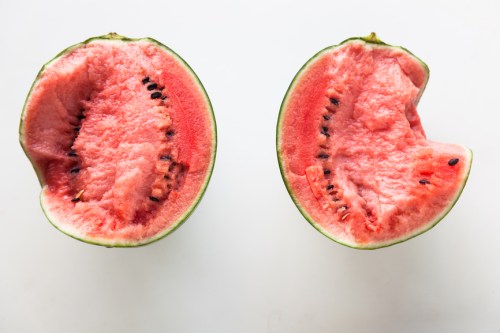When shopping for fruits and veggies, how many of us look and linger for as long as needed to find the most visually appealing produce available? I know I can’t be the only one; after all, there are a handful of food brands built around the very premise of giving “ugly” produce a fighting chance on the market. (And all this time, we thought that the dating market was too selective!)
Experts in This Article
Now, before everyone’s favorite summer fruit goes out of season, we want to let you in on a little secret: You’ll be doing your taste buds a favor (as well as helping reduce food waste) by picking the ugliest watermelon of the bunch—discolorations, dark spots, and webbing included. Below, My Nguyen, chef and creator of My Healthy Dish, explains why.
How to pick a watermelon: 3 “ugly” signs that indicate a high-quality fruit
According to Nguyen, opting for ugly watermelon is a foolproof method for picking the sweetest watermelon in the bin. Although she’s a famous food expert by now, Nguyen says that her father taught her this hack as a child. “He would tell me that picking a sweet watermelon is really easy just by looking at it,” she recalls.
So what constitutes an ugly watermelon, exactly? Keep an eye out for these three key indicators of so-called ugliness that actually indicate an abundance of sweetness and flavor.
1. A big yellow patch
Apparently, those of us who look for uniform shades of green on whole watermelons and shy away from ones with yellow patches have had it wrong this whole time. “You’ll want to look for a big yellow patch, because that’s the part that lays under the sun. The bigger the patch, the longer it was ripening in the ground,” Nguyen says. And as we’re well-aware, peak ripeness means peak sweet and juicy flavor.
2. Lots of webbing
As Nguyen shares in the Instagram video demonstrating this watermelon hack above, when it comes to webbing, the uglier it is, the better. “Webbing is caused by bee pollination, so if there’s more webbing, it’ll be sweeter,” she explains. Even if you have to get an impromptu arm workout to look around for a watermelon with lots of webbing, you’ll find that your efforts will be worth it by the time you get home, get carving, and bite into your sweet summer treat.
3. Dark spots
Next, Nguyen says that you’ll be lucky if you’re able to find a watermelon with a few (or many) dark spots. “These dark spots actually indicate that sugar is seeping out, which is just another sign that the watermelon is very sweet,” she says.
The takeaway
All of this is to say that if you’ve been trying to find the watermelon equivalent of Prince Charming or “a perfect 10,” it’s time to lower your visual standards; a less-than-gorgeous exterior merely masks the fact that it’s what’s inside that counts. (Suddenly, I feel like I’m doling out dating advice…)
“Basically, don’t let looks fool you by going for the perfect green watermelon,” Ngyuen concludes. “Instead, go for the ugliest one you can find.”
Nguyen also adds one final tip worth remembering as you’re working your biceps in search of the sweetest watermelon in the produce aisle or at your local farmer’s market. “The perfect watermelon will be dense and heavy, which indicates that it’s full of water and not dry,” she says.
Of course, this beloved summer fruit should be as juicy as it is sweet—not only for taste and texture, but also for peak hydrating potential. Don’t forget that watermelon contains up to 92 percent water, making it one of the most enjoyable, flavor-filled ways to stay hydrated whether you’re sweating it out in the summer sun or battling wonky A/C in your cramped apartment.
Sign Up for Our Daily Newsletter
Get all the latest in wellness, trends, food, fitness, beauty, and more delivered right to your inbox.
Got it, you've been added to our email list.











